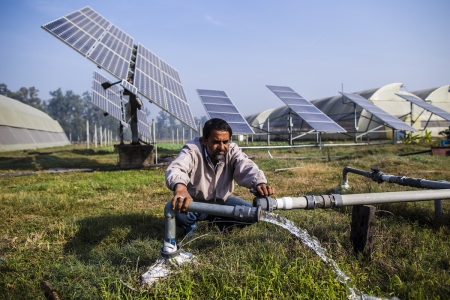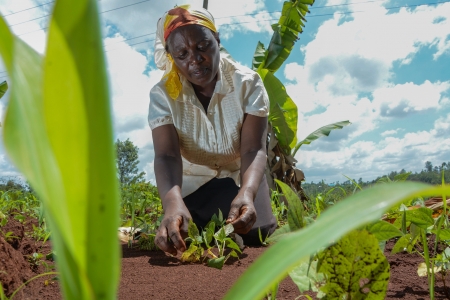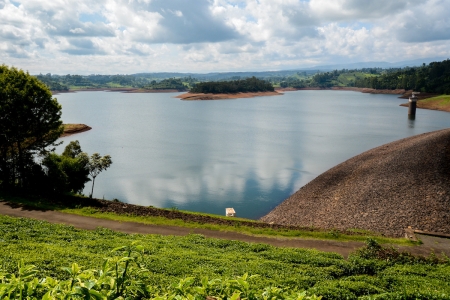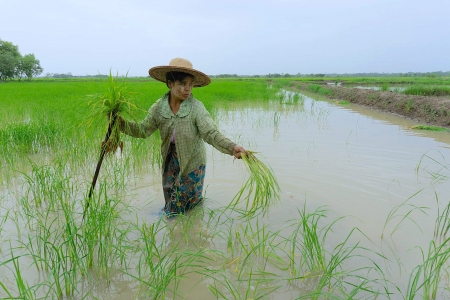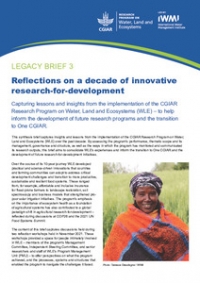Dan McGonigle joined the UK Civil Service in 2007 as a scientific advisor. In 2015 he took three and a half years out to work in CGIAR at Bioversity International before returning to government. His experience, seeing the research being done and knowing how government decision-makers use research results, prompted him to collaborate with colleagues on A Knowledge Brokering Framework for Integrated Landscape Management, recently published in the journal Frontiers in Sustainable Food Systems. In this blog post, he reflects on the genesis of the paper and possible future developments.
One of the things that became clear to me when I started working in a CGIAR center is that there is a divide between research and policy that needs to be bridged. That was the impetus behind our paper.
Many people are doing fantastic work in organizations like CGIAR, coming up with innovative solutions. And a lot of policy-makers are crying out for better evidence to inform their decisions. Their main barriers to working more closely with researchers are the timescales they work on, the language they each use and the way in which they frame questions. Researchers often work on questions that are too narrow to be useful to policy makers, who need to understand the broad implications of interventions, and many researchers don't realize this. The frustration goes the other way as well, because policy-makers often ask questions that are too broad to be answered.
We need to meet in the middle and to develop a shared understanding of each other's world views. We need skilled, trusted knowledge brokers who can bring policy-makers in right at the outset of research design to broaden the set of questions. Some form of co-design also gives researchers a way of working with decision makers so the researchers understand what the decision makers need.
A review of the evidence
Our paper is a review of how evidence can be used to inform policies for integrated landscape management. Land management is one of those crucial nexus issues that has a profound influence on biodiversity decline, water quality, climate change, social equity, dietary health and so many other challenges. If you can get land management right, you can start making inroads into some of these other interacting global problems.
However, policy decisions have to be made in the context of conflicting interests, values and power dynamics of people who live on the land and people affected by the consequences of land use decisions. The difficulty is exacerbated by the scarcity of reliable data on the impacts of land management on the environment and livelihoods. While decision makers need evidence they can use, there are relatively few research methods that can address such questions in a holistic way.
Our paper offers some suggestions on how best to move forward. For example, we offer a series of 'guiding questions' that researchers and policymakers can use as they move through the design cycle of a project. We have also identified the kinds of evidence sources, decision support tools and participatory approaches that can help to inform decisions.
Principles and skills
Knowledge brokers who understand policy and speak the language of science are central to the process. As well as being able to move freely between thinking as a policy-maker and thinking as a researcher, they will also have the facilitation skills to enable those realms to join with other stakeholders in co-creating the research program and policy.
In the paper, we identified some key principles that underpin effective knowledge brokering. For example, we think that pragmatism and timeliness are important because a timely but partial response is likely to be more influential than one that is complete but too late. A good knowledge broker will also ensure that all types of evidence are available, including research findings, observational evidence, process theory, models, and local and indigenous knowledge.
Another key role for knowledge brokers is as a steady point of contact. During the life of a project, government ministers will change and civil servants will move. A knowledge broker can maintain contact within the group. I believe that the best place for those knowledge brokers is hosted within the government department, where they would have better access to decision makers, but tied to the project rather than to either the department or the researchers. This is something CGIAR could promote as an effective way for donors to get more impact from their support.
A missing discipline
As we note in our paper, "The high levels of uncertainty and high decision stakes inherent in many environmental issues mean that policy decisions need to be based on values as much as 'facts'." The way to achieve that is through a knowledge-brokered process that allows decision makers and researchers to agree on the facts that are needed and the values that make the policy necessary.
For me, knowledge brokering is a 'missing discipline'. We need to formalize approaches, provide opportunities for training and develop tools for people working in such roles. Knowledge brokering roles need to be recognized and built into projects and policy programs. CGIAR could support this by building dedicated knowledge brokering units to foster expertise in this area, provide training for government scientists and manage secondments for CGIAR staff into government departments.
Our paper offers a toolkit of toolkits that knowledge brokers and their 'clients' can draw upon to suit the specific context in which they find themselves. The need is certainly there.
---
Thrive blog is a space for independent thought and aims to stimulate discussion among sustainable agriculture researchers and the public. Blogs are facilitated by the CGIAR Research Program on Water, Land and Ecosystems (WLE) but reflect the opinions and information of the authors only and not necessarily those of WLE and its donors or partners.
WLE and partners are supported by CGIAR Trust Fund Contributors, including: ACIAR, DGIS, FCDO, SDC, Sida and others.



/index.jpg?itok=EzuBHOXY&c=feafd7f5ab7d60c363652d23929d0aee)


